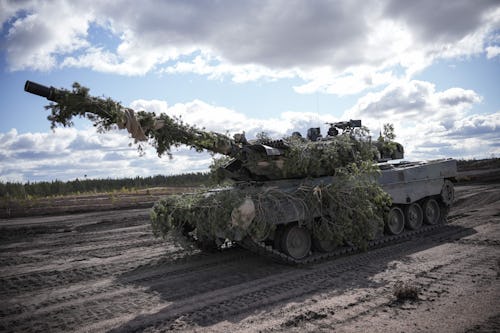
Last week, a deal was announced between the U.K. Ministry of Defense (MoD) and Orca Computing, a quantum computing company, concerning the purchase of a PT-1 model quantum computer that would be able to be placed within a tank.
The PT-1 model is described as “the first computer of its kind to operate at room temperature and be based on-premises,” which are conditions that are suitable for the device to be housed and then eventually optimize the battlefield functionalities of the U.K.’s fleet of tanks. That’s the idea at least, as New Scientist points out the technology was acquired with the initial objective being on training and development.
Richard Murray, the CEO of Orca Computing, reiterated this line of thinking that prioritizes research ahead of application:
“While there has been much discussion and debate in the industry over the realities of near-term quantum computing, our partnership with MoD gives us hands-on close interaction; and working with real hardware will help us to jointly discover new applications of this revolutionary new technology.”
What is quantum computing?—
Well, in a nutshell, quantum computing allows for the quick deduction of highly complex math equations and problems. It’s still a relatively nascent technology, with quantum computers employing the use of qubits (pronounced: CUE-bits) to run algorithms rather than bits, or binary code, which classical machines use to relay tasks.
The onus of quantum computing is ultimately subtle pattern recognition on a minute or molecular scale, and as IBM notes, when faced with complex problems, these systems are able to establish multidimensional spaces “where the patterns linking individual data points emerge.” In short, quantum computers show promise in solving complex equations a lot faster.
Another key differentiator in PT-1 compared to previous quantum computers is its relative portability. The PT-1 from Orca, is able to remain compact and avoid “expensive refrigeration,” thereby making it viable as a research tool for the U.K. military. Previous quantum computers required temperatures of absolute zero in order to function; not ideal in an active combat situation.
Still, it’s unclear what the actual application will be for the implementation of a quantum computer, especially within a military context. The proposed uses include advancements in “information processing for command decisions,” and “communication on the battlefield.”
Again, these explanations are fairly vague when compared to other quantum computing applications, like the study of amino acid behavior. Regardless, it looks like another major military force will have some new tech to play with.







